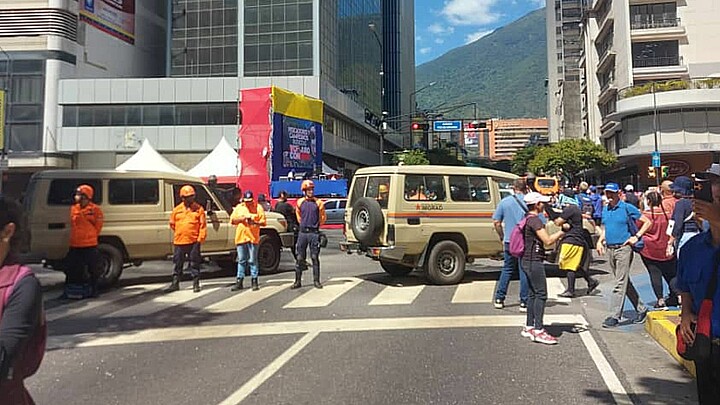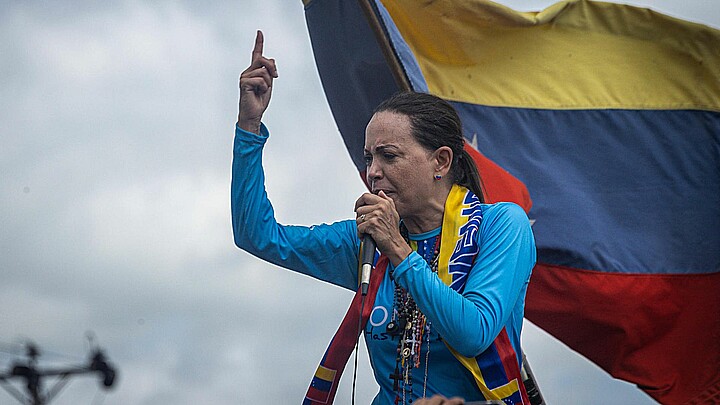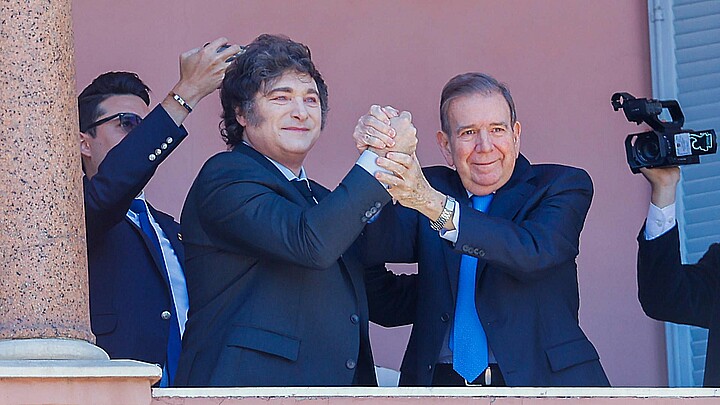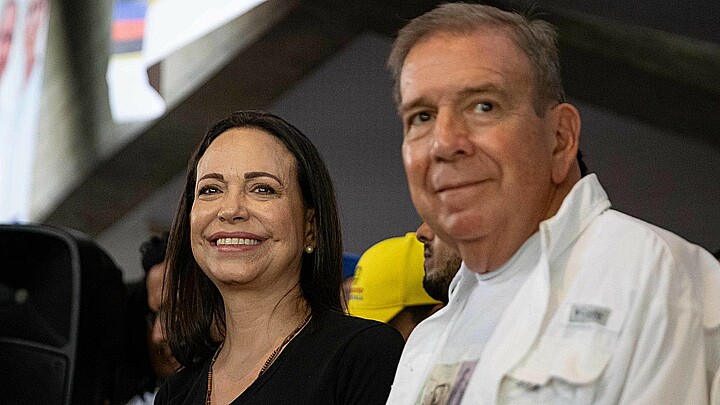Politics
Young Venezuelan non-voters use anti-communist war cry to support conservatives in U.S. and Latin America
The phenomenon is the culmination of years long outgrowth of anti-authoritarianism and opposition to socialist ideas, similar to the impact the Cuban American community has had since it began emigrating to the United States after the 1959 Castro Revolution

January 22, 2024 9:14am
Updated: January 22, 2024 1:28pm
The Venezuelan American community’s painful experience with communism under the tyranny of dictator Nicolas Maduro has grown into a regional war cry for conservatives in the U.S. and throughout Latin America, according to several reports.
The phenomenon is the culmination of years long outgrowth of anti-authoritarianism and opposition to socialist ideas, similar to the impact the Cuban American community has had since its mass emigration to the United States after the 1959 Castro Revolution.
The war cry has transcended the borders of South America and into other areas of the Western Hemisphere throughout Latin America, including the United States, wherever Venezuelan refugees have landed amid their journey to escape the communist policies of their country.
Venezuela has increasingly gone from being one of the wealthiest and most economically successful countries in South America to one of the worst under the specter of communism. The economy shifted in 2002 after Fifth Republic Movement and United Socialist Party leader Hugo Chavez, took over.
Under Chavez, and Maduro, who was his communist successor, Venezuela has seen economic catastrophe, widespread corruption and brutal repression against civil society, dissidents, and pro-democracy opposition leaders.
While Maduro’s leadership faces a stronger challenge from the pro-democracy opposition than ever before with the rise of Maria Corina Machado, the “pink tide” of socialism washing across the region in electoral victories in once healthy capitalist economies such as Brazil, Chile, Colombia and Mexico has sparked concerns throughout the entire region that those countries—and others—could end up like Venezuela.
The victory of free market economics professor Javier Milei in Argentina has also served as an inspiration to many, signaling that this is the time to take back the Western Hemisphere and tilt the tide back toward free market economies.
In fact, when Milei was inaugurated in December, Argentinians flew both the national flag and the Venezuelan flag, a sign that the self-described anarcho-capitalist was rising as a symbol to counter Maduro as the region’s token Marxist-Leninist.
One of the Venezuelan immigrants who attended the inaugural celebration, 36-year-old Laura Ruiz, told NBC she waved a Venezuelan flag because she wanted Milei to know that people from her country supported his efforts.
While she couldn’t vote, she said she became “indirectly” part of the election process by showing her support for the pro-freedom right—a phenomenon that Ariel Goldstein, a political scientist at the University of Buenos Aires, says is growing.
“Venezuela represents something like the specter of communism … The right wing in the region has found in Venezuela a clear image that symbolizes the failures of that system,” he said.
This should come as no surprise since, during his campaign, Milei took direct aim at Maduro, saying that support of his opposition would only set Argentina “on a spiral of decay that will bring us the darkness of Chávez and Maduro’s Venezuela.”
While Milei’s victory has sparked hope throughout Latin America, it has also become an inspiration to the millions of Venezuelan refugees who have fled their country in hopes of once again finding freedom.
According to the United Nations, an estimated 7.7 million Venezuelans have fled their homeland in recent years. The exodus has created one of the most significant migrant crises in Latin America and at the U.S. southwest border in history.
“Despite some spontaneous returns of Venezuelan nationals to their country of origin, the outflow of Venezuelan refugees and migrants to neighboring countries and beyond persists. The number of refugees and migrants from Venezuela has surpassed 7 million globally, according to data from governments. A significant number of them are in need of international protection and humanitarian assistance,” says a report published by UNHCR, the United Nation’s international refugee agency.
The international agency says that the crisis become so significant, it has far overstretched resources in many countries that are hosting the refugees.
“While host communities and countries in the region are committed to helping Venezuelans and have been generously welcoming them, they are increasingly overstretched. Several countries are implementing large-scale regularization processes to ensure refugees and migrants are documented and have access to rights and services … Most refugees and migrants from Venezuela arriving in neighboring countries are families with children, pregnant women, elderly people, and people with disabilities.”
While many of these refugees struggle to survive, their hardship has not stopped them from speaking out against the same brand of leftism that compelled them to leave Venezuela.
As such, they have opposed left wing candidates throughout Latin America, and even Democrats in the United States, becoming staunch supporters of the Republican Party as the Cuban American community did throughout the 20th century.
Such support helped transform the vote in favor of Republicans in Florida, especially in places highly populated by Venezuelans such as Miami-Dade County which saw Democratic support drop dramatically in the 2020 presidential election.
Former Secretary of State Hillary Clinton won the area by 27 points in 2016, but then candidate and former vice-president Joe Biden barely edged it out by 7 points in 2020, according to a Nov. 4, 2020 report published by The Washington Post.
More and more Republican rallies in the South Florida area are seeing a showing of Venezuelan support as evidenced by flags, banners and social media comments published online.
While many of the Venezuelan migrants cannot vote as they await their asylum hearing, they are making their voices heard.
Another candidate who won support from the growing Venezuelan diaspora in his country is newly elected Ecuadorian president Daniel Noboa, widely considered a conservative leaning candidate throughout the 2023 election.
One of the Venezuelans who support Milei in Argentina was Elisabet Hernández, who emigrated to Córdoba from the Venezuelan port town of Maracaibo.
Feeling powerless, Hernández said she “became very depressed” when she realized her new home in Argentina could be headed for the same pitfalls in her home country of Venezuela.
As such, she took to social media to make her voice heard.
While Milei was widely characterized as the underdog in the 2023 presidential election, Hernández amassed thousands of followers on a TikTok account titled “atrapada en socialismo,” or "trapped in socialism."
To gain attention, she produced videos saying she came from the future to warn her new Argentinian brothers and sisters about the dangers of communism and asked them to support Milei. She also campaign for Milei by handing out leaflets in support of his political ideologies.
“Lots of people have written to me to let me know that hearing about my experience opened their eyes,” she told NBC.
She says that Venezuelans throughout the Western Hemisphere are now acting as messengers, delivering an important message about what can go wrong in other countries if they don’t learn from history.
“The Venezuelan diaspora is extremely politically active, both around what’s happening in Venezuela, but also in the local politics of the places they find themselves in now,” she explained.
Some of the non-voting activists are young. A recent Nov. 18 report published by Foreign Policy noted how many Milei supporters actually flew the Gadsden flag from the American Revolution with the slogan, “Don’t Tread on Me.”
“Milei’s ascent from libertarian economist to one-term congressman and now viable presidential candidate was rapid. Recent polling shows him with a narrow 4-point lead over Massa ahead of the runoff. Milei owes his success largely to social media—and the young voters who use it.
The report says that Milei cleverly capitalized off that support by making videos of his own to reaffirm his support from the youth vote.
“That strategy proved especially effective among younger voters. Voters under the age of 29 are credited with making Milei a contender for the presidency: Polls show that nearly 50 percent of that cohort support the far-right candidate. ‘This movement was born with you,’ Milei said in a tweet addressed to young people published shortly before the Oct. 22 first-round vote,” Foreign Policy reports.
One of the young Venezuelans in Argentina who could not vote is 33-year-old José Mago. Mago started his own a TikTok account to create a travel blog, but after his videos of Milei rallies sparked attention, he became inspired, and turned the account into something political.
Twenty-one-year-old Venezuelan medical student Edilber Mendoza, 21, who emigrated to Argentina four years ago says his video pushing Argentinians to “vote the right way” went viral.
“Cubans warned us, and [now] we are warning you,” he continued. That video quickly earned millions of views and was shared by Javier Milei online.
“We have been very influential here,” Mendoza told NBC.











